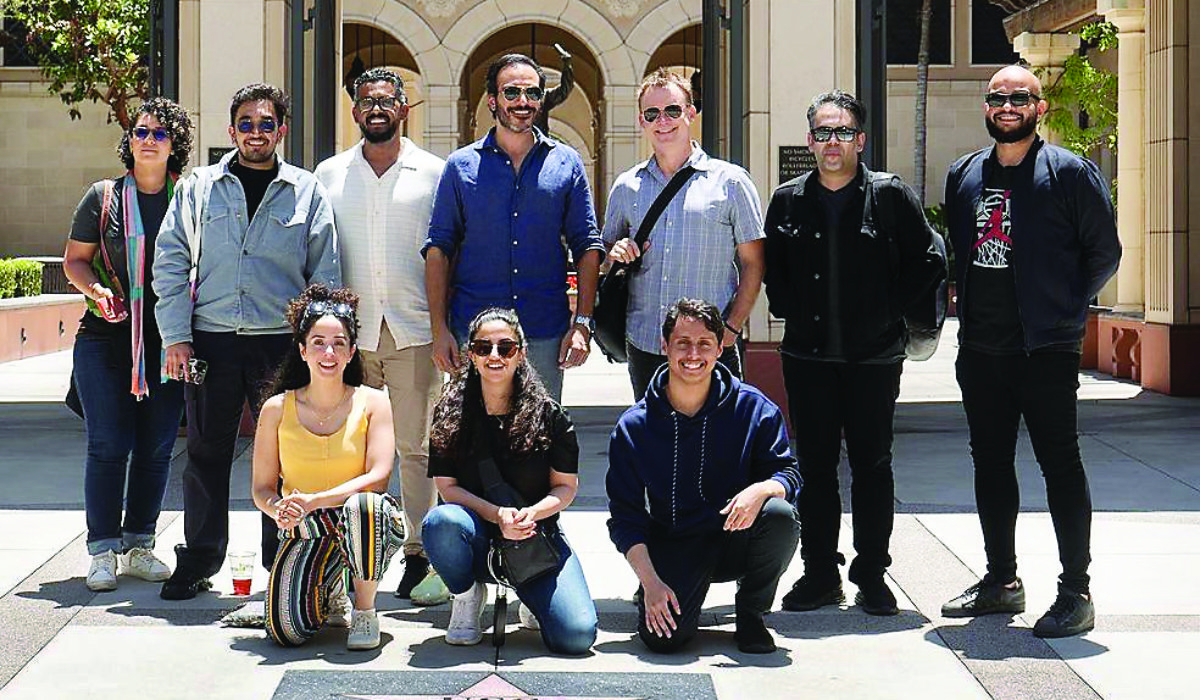JEDDAH: In a world captivated by the allure of episodic storytelling, the Red Sea Labs’ SeriesLab has emerged as a beacon of opportunity for aspiring Saudi scriptwriters to dive into the world of television scriptwriting.
With a comprehensive curriculum and exceptional industry connections, the SeriesLab stands as a testament to the Red Sea Film Foundation’s commitment to fostering emerging Saudi talents and revitalizing scriptwriting for the TV industry.
The innovative seven-month program kicked off in June and will continue until the end of the year. It is a dynamic blend of hands-on training, mentorship, and immersive experiences designed to shape the future of TV series production in the Kingdom.

The Red Sea labs’ program plays a pivotal role in shaping the TV writing landscape in the region. (Supplied)
The program was opened exclusively to Saudis and Saudi residents, providing a platform for local talents to shine on the global stage. The response was overwhelming, with over 100 applications received for the inaugural edition. After a rigorous selection process that included interviews and evaluations, the final roster of eight talented writers — including three women — emerged, all ready to embark on this transformative journey.
As part of the journey, the third phase offers participants a one-week workshop in Jeddah, including various lectures and joint sessions with industry professionals. Guest tutors include Philip Buiser, a writer from television and film whose credits include “Bates Motel”; voice coach Andrea Odinov; Joe Peracchio, a writer and producer with credits including “The Flash” on the CW network; Josh Berman, a writer and producer who was nominated for two Primetime Emmy Awards; and Adrienne Thomas, a manager in the Creative Talent Development and Inclusion department at Disney General Entertainment Content.
We are learning from the pros, like people who are doing it in Holly- wood. So, we can share this information with the people around us. We can build a great industry in our country.
Yaser bin Abdulrahman, Scriptwriter
The inaugural program began with a virtual session that laid the foundation for understanding the intricacies of writing for TV. Guided by industry experts, the participants embarked on a path of exploration and growth.
In July, the participants went through in-person sessions in Los Angeles, the heart of the US entertainment industry, where they had the unique opportunity to collaborate with seasoned showrunners and writing experts, and even step foot inside the renowned Disney Studios Lot. This immersive experience provided firsthand insights into the TV production process, igniting their passion and helping to hone their skills.

The Red Sea labs’ program plays a pivotal role in shaping the TV writing landscape in the region. (Supplied)
Ryan Ashore, head of Red Sea Labs, told Arab News: “We took them to the Disney Studios. They showed them all kinds of technical details. And I’m hoping those writers see these details.
“We sat down with the vice president of Talent Development and Inclusion from Disney. A man with extensive experience, Tim McNeal. They were talking about how they select the talents, how they evaluate pilot scripts or TV series cribs.
HIGHLIGHTS
• The SeriesLab program kicked off in June and will continue until the end of the year.
• The eight writers were selected after a rigorous process that included interviews and evaluations.
• The third phase involves a one-week workshop in Jeddah with industry experts. • In July, the participants went through in-person sessions in Los Angeles.
“With certain methods that our writers now know, they have that knowledge now. They sat down with a director who did episodes from ‘The Shield,’ ‘The Walking Dead,’ ‘The Mentalist,’ and so many.
“It’s good to see how a director directs in TV because it's completely different from filmmaking.”
Beyond individual development, the Red Sea Labs’ program plays a pivotal role in shaping the TV writing landscape in the region. By nurturing emerging talents, the program contributes to the evolution of the industry by infusing fresh perspectives and innovative ideas. This injection of new blood aims to inspire the creation of groundbreaking series that resonate with global audiences.

The Serieslab program’s winning project will be announced at the next Red Sea international Film Festival in Jeddah. (Supplied)
Ashore said: “It’s our mandate, our promise that we are going to build the industry in the right way.
“When I created the labs, I looked at Sundance Labs. Sundance in the US is one of the leaders. They have so many filmmakers that came out of it. Tarantino and Wes Anderson went to the Sundance Labs. So, these people had to go through that to evolve.
“And that’s how we build the industry slowly. And I really want to start with the younger generation.”
Speaking about the differences in developing content for TV compared to feature films, he said: “Feature films are different when you’re directing: You’re the master. In TV, the writer is the master. And that’s why a lot of TV series are affected completely by writer strikes.”
Among the participants is Yaser bin Abdulrahman, a 23-year old emerging Saudi director and scriptwriter who is currently developing a crime series.
He told Arab News: “I feel like there’s a lot of responsibility being involved in the SeriesLab. I need to focus on writing and I need every piece of information I can apply to my stories.”
Abdulrahman studied filmmaking in LA in 2018 and co-directed a Saudi thriller called “Junoon,” which was released in 2021 and is now streaming on Netflix.
Another participant is Aziz Madhi, 24, a scriptwriter who has produced two shorts, and is currently developing a drama series.
He said: “Pitching and presenting your project to everyone, communicating with a huge network from the industry, and finding out how you can communicate your story, reflecting on yourself and displaying your idea the best way possible, is really mesmerizing. That’s a big plus in that lab, in addition to writing.
“We are in a new industry now, the cinema and TV industry. We have to learn from the professionals, from the people who have been doing it for the past 100 years. And I think this opportunity is really special, said Yaser Abdulrahman.
“We are learning from the pros ... we can share this information with the people around us. We can build a great industry in our country.”
Writers will receive assignments and personalized guidance to apply the acquired knowledge following each workshop. The program concludes with a comprehensive review of all topics covered, ensuring the writers have attained a high level of proficiency.
Individuals selected by Red Sea Labs are required to fully engage in the training throughout the program’s duration. This entails active participation in all sessions, adhering to the program’s expectations as set by mentors and course moderators, and maintaining their availability to advance their projects between workshops while meeting designated deadlines.
Writers should have developed a series pilot and be ready to pitch to TV networks and streamers by the end of the program.
SeriesLab writers will also have a connection with industry experts, and the winning project will be announced at the Red Sea International Film Festival in Jeddah, which takes place from Nov. 30 to Dec. 9.



































